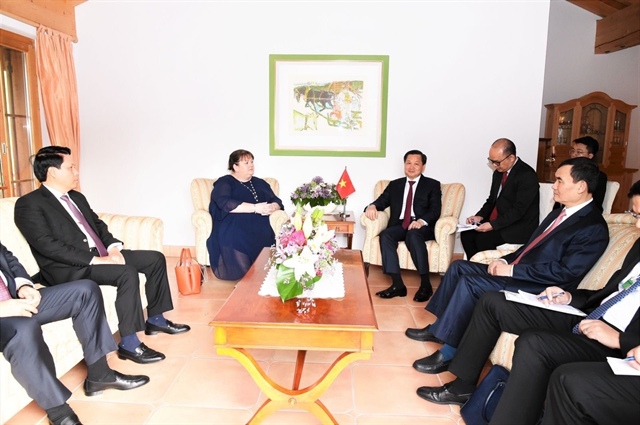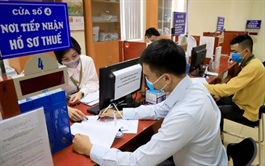HSBC helps Vietnam light up green journey
HSBC helps Vietnam light up green journey
HSBC has achieved 10 percent of its commitment to help arrange up to US$12 billion of direct and indirect sustainable financing for Vietnam by 2030 and is working to help unlock additional international financing opportunities to help Vietnam achieve its ambitious net zero plans.

Vietnamese Deputy Prime Minister Le Minh Khai met with Amanda Murphy, HSBC Asia Pacific’s Co-Head of Commercial Banking in Davos, Switzerland |
Vietnamese Deputy Prime Minister Le Minh Khai on May 23 led a Vietnamese delegation to attend the 52nd World Economic Forum (WEF) in Davos, Switzerland. During his trip, the DPM met with Amanda Murphy, HSBC Asia Pacific’s Co-Head of Commercial Banking to discuss one of the country’s top priorities, its transition to Net Zero.
The strong commitment made by Vietnam’s government last year at COP26 was a historic step in the country’s strategy to tackle climate change and was widely endorsed by many other countries. Vietnam pledged that it would reach its net zero carbon emissions target by 2050 and has agreed to phase out coal-fuelled power generation in the 2040s (or as soon as possible thereafter). The pledge will ultimately motivate the country to shift to a greener and more sustainable economy. Since the commitment was made, the Government has mapped out its plan to accelerate Vietnam’s green agenda, with a special focus in the renewable energy sector.
As electrification, the shift to electricity as a power source, plays an important role in decarbonization across economic sectors, Vietnam needs to generate renewable power at scale. This key transition driver will gradually replace fossil fuels, thus lowering emissions across land-based means of transportation, and in multiple industrial activities.
Fast growing demand
Vietnam’s power demand is expected to increase at pace along with the country’s strong economic growth. In 2021, the total FDI to Vietnam was more than US$31.15 billion, over US$18.1 billion of which was poured into the processing and manufacturing industry which requires power, not to mention the demand of an ever growing population of nearly 100 million.
According to Mr. Khai, the country’s total power demand will reach more than 100GW by 2025 and 150GW by 2030, 36GW and 50GW of which will be from renewable means respectively. The average demand of renewables will account for more than 30 percent of the country’s energy mix. Consequently, the country will need to invest US$115.96 billion in new power plants and power grid expansions by 2030, and up to US$227.4 billion by 2045, when installed capacity should reach 329.6GW, according to the Power Development Plan VIII covering the period 2021-2030. The plan also highlights the strong growth of non-hydro renewables which will rise from 13 percent today to nearly 30 percent in 2030 and over 40 percent by 2045.
According to the International Energy Agency, Vietnam is the second-largest electricity consumer in Southeast Asia, and has one of the fastest-growing levels of energy demand in the world. Clearly the country needs to increase its power generation to support its economic growth. This cannot be done alone. The demands are such that there is a need for both public and private sector involvement in ensuring that Vietnam has the energy and the type of energy it needs to continue to grow sustainably.
Greener power for Vietnam
Going forward, greener and cleaner electricity will be needed to continue to support the strong economic development of Vietnam in a sustainable manner, particularly if it is to achieve it’s net zero ambition made at COP26. As Mr. Khai said, it is not a walk in the park to ensure national energy security for growth and lower emissions at the same time. Vietnam will need further support in resources, technologies and governance capabilities to help solve this puzzle.
The financing requirements from renewable energy especially from the capital-intensive wind power will soon surpass the lending capacity of many onshore banks. There is clearly a role for international banks like HSBC to play to help unlock the flows from the international capital markets. As environmental, social and governance (ESG) trends continue to rise, so will investor interest in sustainable investing opportunities. We have witnessed significant appetite from investors for Vietnam and are working with them to channel that capital towards green projects to deliver the green infrastructure at an efficient cost.
Earlier this year, we announced our commitment to help arrange up to US$12 billion of direct and indirect sustainable financing for Vietnam by 2030. The commitment aligns with HSBC Group’s ambition of providing between US$750 billion and US$1 trillion in sustainable financing and investment by 2030 and raised during the meeting between our CEO, Noel Quinn and Vietnam’s Prime Minister Pham Minh Chinh at the COP26 last November. To date, we have contributed to arranging up to US$1.3 billion of green financing for different projects in Vietnam, which is over 10 percent of our commitment. The projects range from EVs, green buildings, plastic recycling and renewables.
Unleashing the potential
Energy transition poses challenges but it also presents a world of opportunities that together we can open up for Vietnam. The Government’s effort to continuously diversify its energy mix with a heavy focus on renewable energy projects has put the country in a prime position to become a top clean energy investment destination. To unlock international financing for renewable energy in Vietnam, we propose to review some of the current regulatory barriers as below:
- The restriction on the use of foreign debt to repay local debt which hinders the offshore refinancing of greenfield local debt provided by Vietnamese banks, by allowing this there will be more capacity for Vietnamese banks to support greenfield projects.
- The single borrower limit which restricts the value of bank guarantees that Vietnamese banks can provide in favor of Export Credit Agencies (ECAs) and international financiers. Risk sharing is critical to finance large projects.
- Build a green lending framework in Vietnam, having consistent measures across the financial sector to certify green financing is critical to develop a set of checks and balances to mitigate the risk of green washing.
What has been done to date is positive but it is are just the tip of the iceberg given with Vietnam’s great potential in this space. We expect many more green projects to come online in the near future, which and we are very excited to help make it happen in Vietnam and for Vietnam.





















